Intro
Identify the 7 hydration signs, including dry skin and fatigue, to prevent dehydration. Learn the key indicators, such as dark urine and headaches, to stay hydrated and healthy, boosting energy and overall well-being.
Staying hydrated is essential for maintaining physical health, as it helps regulate body temperature, transports nutrients and oxygen to cells, and removes waste products. Despite its importance, many people do not drink enough water throughout the day, leading to dehydration. Dehydration can cause a range of symptoms, from mild to severe, and can affect anyone, regardless of age or health status. It is crucial to recognize the signs of dehydration to take prompt action and prevent complications.
Dehydration can occur due to various reasons, including insufficient fluid intake, excessive sweating, vomiting, diarrhea, and certain medical conditions. The human body is composed of approximately 60% water, and even mild dehydration can cause significant disruptions to bodily functions. The signs of dehydration can be subtle, making it essential to be aware of the common indicators that the body needs more fluids. By understanding these signs, individuals can take proactive steps to stay hydrated and maintain optimal health.
The importance of hydration cannot be overstated, as it plays a critical role in maintaining physical performance, cognitive function, and overall well-being. Even mild dehydration can cause fatigue, headaches, and difficulty concentrating, while severe dehydration can lead to life-threatening complications. Recognizing the signs of dehydration is the first step towards taking corrective action and preventing dehydration-related problems. By being mindful of the body's hydration needs and taking steps to address them, individuals can maintain optimal health, improve physical performance, and reduce the risk of dehydration-related complications.
Introduction to Hydration Signs
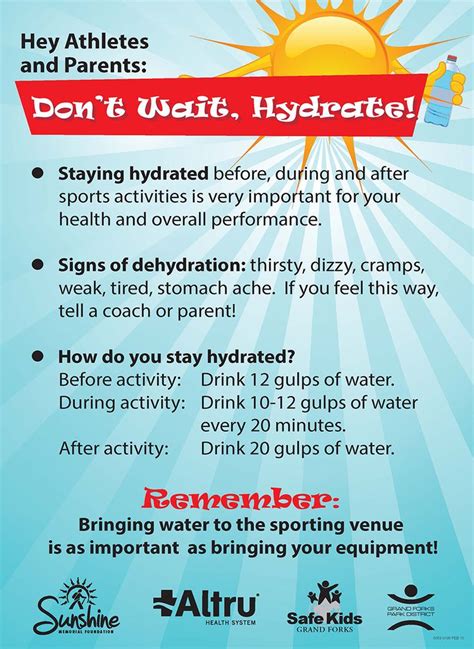
Hydration signs are the body's way of indicating that it needs more fluids to function properly. These signs can range from mild to severe and can affect different aspects of physical and cognitive health. By recognizing these signs, individuals can take prompt action to rehydrate and prevent dehydration-related complications. The most common hydration signs include dark yellow or brown urine, dry mouth, fatigue, headaches, and dizziness. These signs are often accompanied by other symptoms, such as decreased urine output, sunken eyes, and low blood pressure.
Common Hydration Signs
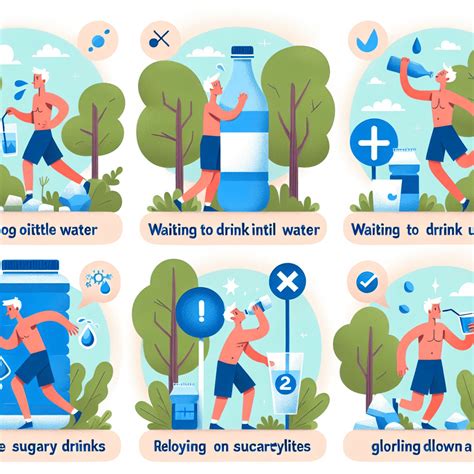
The most common hydration signs are those that affect the body's physical and cognitive functions. These signs include:
- Dark yellow or brown urine, which indicates that the body is not producing enough urine to remove waste products
- Dry mouth, which can cause difficulty swallowing and speaking
- Fatigue, which can affect physical performance and cognitive function
- Headaches, which can range from mild to severe and can be accompanied by other symptoms such as nausea and vomiting
- Dizziness, which can increase the risk of falls and other accidents
These signs are often accompanied by other symptoms, such as decreased urine output, sunken eyes, and low blood pressure. Recognizing these signs is essential to taking prompt action and preventing dehydration-related complications.
Severe Hydration Signs
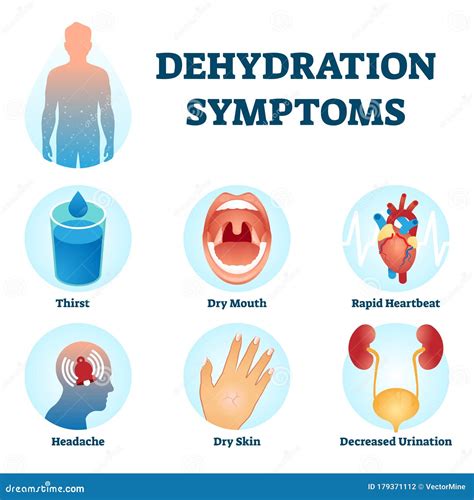
Severe hydration signs are those that can cause significant disruptions to bodily functions and can lead to life-threatening complications. These signs include:
- Severe headaches, which can be accompanied by other symptoms such as nausea and vomiting
- Confusion, which can affect cognitive function and increase the risk of accidents
- Seizures, which can be life-threatening and require immediate medical attention
- Low blood pressure, which can cause dizziness and fainting
- Decreased urine output, which can indicate that the kidneys are not functioning properly
These signs require immediate medical attention, as they can lead to severe dehydration and life-threatening complications. Recognizing these signs is essential to taking prompt action and preventing dehydration-related problems.
Causes of Dehydration
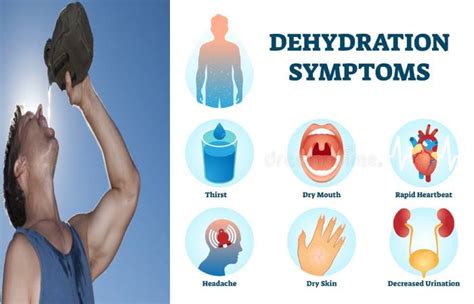
Dehydration can occur due to various reasons, including:
- Insufficient fluid intake, which can cause the body to lose more fluids than it takes in
- Excessive sweating, which can cause the body to lose electrolytes and fluids
- Vomiting, which can cause the body to lose fluids and electrolytes
- Diarrhea, which can cause the body to lose fluids and electrolytes
- Certain medical conditions, such as diabetes and kidney disease, which can affect the body's ability to regulate fluids
These causes can lead to dehydration, which can cause a range of symptoms, from mild to severe. Recognizing the causes of dehydration is essential to taking proactive steps to prevent dehydration-related complications.
Preventing Dehydration
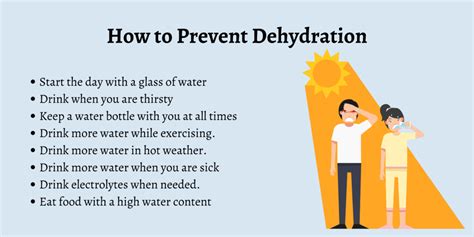
Preventing dehydration requires taking proactive steps to ensure that the body gets enough fluids to function properly. These steps include:
- Drinking plenty of water throughout the day
- Avoiding excessive sweating and heat-related illnesses
- Eating foods that are high in water content, such as fruits and vegetables
- Avoiding caffeinated and carbonated beverages, which can cause the body to lose fluids
- Monitoring urine output and color, which can indicate whether the body is getting enough fluids
By taking these steps, individuals can prevent dehydration and maintain optimal health. Recognizing the signs of dehydration is essential to taking prompt action and preventing dehydration-related complications.
Treatment of Dehydration
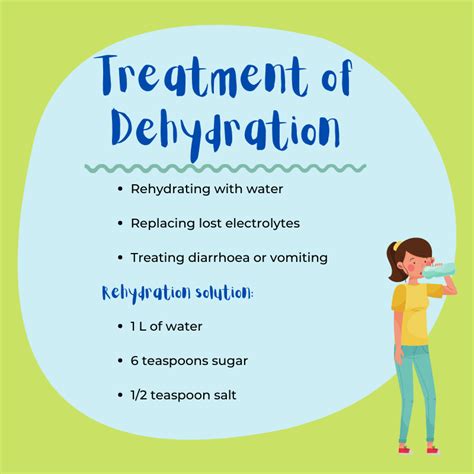
The treatment of dehydration depends on the severity of the symptoms and the underlying cause. Mild dehydration can be treated by drinking plenty of water and electrolyte-rich beverages, such as sports drinks. Severe dehydration requires immediate medical attention, as it can lead to life-threatening complications. Treatment may include:
- Intravenous fluids, which can help replace lost fluids and electrolytes
- Medications, which can help treat underlying medical conditions that may be contributing to dehydration
- Rest and relaxation, which can help the body recover from dehydration-related stress
Recognizing the signs of dehydration is essential to taking prompt action and preventing dehydration-related complications. By understanding the treatment options available, individuals can take proactive steps to maintain optimal health and prevent dehydration-related problems.
Conclusion and Next Steps

In conclusion, recognizing the signs of dehydration is essential to taking prompt action and preventing dehydration-related complications. By understanding the common hydration signs, severe hydration signs, causes of dehydration, and treatment options available, individuals can take proactive steps to maintain optimal health and prevent dehydration-related problems. It is crucial to stay hydrated, especially during hot weather, physical activity, or when experiencing illnesses that cause vomiting or diarrhea. By being mindful of the body's hydration needs and taking steps to address them, individuals can maintain optimal health, improve physical performance, and reduce the risk of dehydration-related complications.
We invite you to share your thoughts and experiences with dehydration in the comments section below. Have you ever experienced dehydration? What steps do you take to stay hydrated? Share your tips and advice with others, and let's work together to maintain optimal health and prevent dehydration-related problems.
What are the common signs of dehydration?
+The common signs of dehydration include dark yellow or brown urine, dry mouth, fatigue, headaches, and dizziness. These signs can range from mild to severe and can affect different aspects of physical and cognitive health.
How can I prevent dehydration?
+Preventing dehydration requires taking proactive steps to ensure that the body gets enough fluids to function properly. These steps include drinking plenty of water throughout the day, avoiding excessive sweating and heat-related illnesses, eating foods that are high in water content, and monitoring urine output and color.
What is the treatment for severe dehydration?
+The treatment for severe dehydration requires immediate medical attention, as it can lead to life-threatening complications. Treatment may include intravenous fluids, medications, and rest and relaxation. Recognizing the signs of dehydration is essential to taking prompt action and preventing dehydration-related complications.
